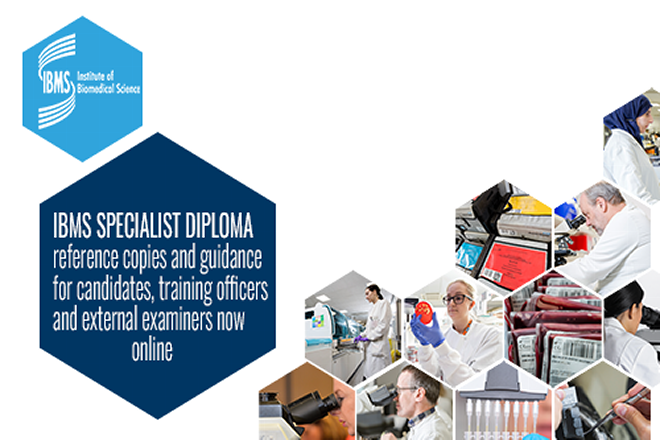Specialist Portfolio Update

IBMS Specialist Diplomas were launched at Congress in 2005 to meet the profession’s need for a national standard in post-registration training in the pathology disciplines. Designed by the profession for the profession, they quickly set the bar for specialist laboratory training across the UK.
Demand has steadily increased since they were first introduced (we have issued over 700 in the last 12 months) because they give HCPC registered biomedical scientists the chance to progress in their careers, gain promotions and demonstrate their specialist knowledge and skills.
The IBMS advisory panels and Council (made up of our Members and Fellows in the profession) help us to keep the content of the portfolios at the cutting edge and, as such, they are frequently updated to reflect current practice.
The fourth editions have now been signed off by our specialist advisors in the field and will be available from September. Overall, the changes are minor this time around. Training officers and laboratory managers can be reassured that there are no significant differences in the structure or content of the portfolios, and the requirements for evidence are the same. Major changes to laboratory training programmes will not be necessary.
The changes that have been made are as follows:
- There is now a separate document entitled: Guidance for Candidates, Training Officers and External Examiners in the related documents section here. This document provides all the necessary advice and guidance required to complete the portfolio. It is essential that all trainers, candidates and external examiners read and understand its content.
- Each discipline specific portfolio has a six section summary (Introduction, Training, Evidence, Completing the record of laboratory training, End-point assessment, Completion of reports and Award) to remind the candidate of key points.
- The Diploma of Biomedical Sciences has been re-named Specialist Diploma in Blood Sciences. This is made up of sections that contain modules in Clinical Biochemistry, Haematology and Transfusion Science. The award is achieved by completing two or three sections in the following combinations:
- Clinical Biochemistry and Haematology
- Clinical Biochemistry and Hospital Transfusion Practice
- Clinical Biochemistry, Haematology and Hospital Transfusion Practice
Please note: a combination of Haematology and Hospital Transfusion Practice together is not an option as you would be expected to take on the Specialist Diploma in Haematology with Hospital Transfusion Practice in this instance.
- There is an optional Molecular Pathology module for Cellular Pathology which is also available as a stand-alone module for those who have already completed their Specialist Diploma in Cellular Pathology. This requires an additional stage for the end-point examination.
- The Specialist Diploma in Cytopathology differs from other disciplines in that it is linked to national qualifications and has modules in cervical cytology, non-cervical cytology and Human Papillomavirus (HPV). Depth and breadth of knowledge must be achieved in a minimum of 2 out of the 3 modules in the relevant section of the portfolio (either A or B).
As before individuals completing the portfolios must be in a corporate class of IBMS membership and be working in a laboratory with Institute approval for post-registration training. Applications must be submitted by the training officer/manager, not the candidate. Applicants must retain their IBMS membership throughout their study of the Specialist Diploma. The portfolio is not available to Associate members or non-HCPC registered Licentiate members. All evidence should be gathered within three years of the application for external examination.
Please note: the introduction of version 4 triggers an expiry limit of three years on any superseded version of a Specialist Diploma (i.e. those with version 3 will be expected to complete by September 2021).
